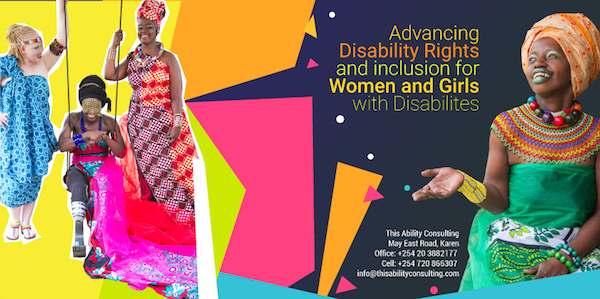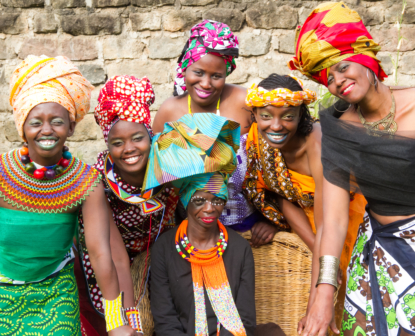Project
Huu’Wezo: advancing the sexual and reproductive rights of women with disabilities
-
Amount Funded
170,116 EUROProject Duration
01 Sep 2018 - 31 Aug 2020 -
-
Lead organisation
-
This-Ability is a social enterprise working to advance disability rights and inclusion for women and girls with disabilities. The model focuses on using business principles to make the case for investing in women and girls with disabilities. The work prioritises building the voice of young women with disabilities, creating visibility for sexual and reproductive rights and facilitating dialogue and engagement with key stakeholders.
-
Organisation
This-Ability is a social enterprise working to advance disability rights and inclusion for women and girls with disabilities. The model focuses on using business principles to make the case for investing in women and girls with disabilities. The work prioritises building the voice of young women with disabilities, creating visibility for sexual and reproductive rights and facilitating dialogue and engagement with key stakeholders.
-
Project
Huu’wezo project creates visibility for the sexual and reproductive health and rights of young women with disabilities through applying business principles of marketing and advertising. The existing narrative of asexuality has meant that young women with disabilities are closed off from accessing what are their fundamental rights. Efforts to correct the situation have often taken up a charity or medical model, which is not sustainable in the long term.
Making the case for investment through running a combination of photography series, advertising and advocacy campaigns around disability and sexuality, the project initiates stimulating conversations and educating the general public on disability rights, while also being supported by collaborative activities within mainstream media companies and targeted engagement with young women with disabilities. The project also increases access to quality sexual and reproductive health services and information for young women with disabilities by infiltrating mainstream media.
-
-
Huu’wezo project creates visibility for the sexual and reproductive health and rights of young women with disabilities through applying business principles of marketing and advertising. The existing narrative of asexuality has meant that young women with disabilities are closed off from accessing what are their fundamental rights. Efforts to correct the situation have often taken up a charity or medical model, which is not sustainable in the long term.
Making the case for investment through running a combination of photography series, advertising and advocacy campaigns around disability and sexuality, the project initiates stimulating conversations and educating the general public on disability rights, while also being supported by collaborative activities within mainstream media companies and targeted engagement with young women with disabilities. The project also increases access to quality sexual and reproductive health services and information for young women with disabilities by infiltrating mainstream media.
-
Despite the strides made in increased advocacy for the rights of women in Kenya, young women with disabilities have remained a marginalised group with their rights left out of the conversation.
With this project, This Ability aimed to create visibility for the sexual and reproductive health rights of young women with disabilities through business principles of marketing and advertising. The existing narrative of asexuality has meant that young women with disabilities are closed off from accessing what are their fundamental rights. The methods aimed at stimulating conversations and educating the general public on disability rights, while also being supported by collaborative activities within mainstream media companies and targeted engagement with young women with disabilities. Additionally, the project also aimed to increase access to quality sexual and reproductive health services and information for young women with disabilities by infiltrating mainstream media.
The learning questions the project seeked to answer was:
- What new and unconventional methods of advocacy have not been explored in the area of disability activism?
- How effective is infiltrating mainstream media with positive images of disability in shifting existing narratives?
- What happens when power is given back to young women with disabilities and the conversation centered on them exclusively?
- Does exploring the non-sexualisation of women with disabilities result in increased access to quality sexual and reproductive health services and information?
The various results achieved included; the positive visibility created around women with disabilities and their sexual and reproductive rights. This Ability has been changing the narrative on women with disabilities, from a “victim” standpoint to a positive and powerful narrative from a gender and human rights standpoint. Through the 4 advocacy forums in Nairobi, Mombasa, Kisumu and Kajiado counties creating awareness about the rights of women with disabilities and opening discussions on their own needs and proposals to change the reality, the women initiated “controversial” and taboo topics like menstruation health, hygiene and safe abortion within the public discourse.
The use of new technologies, such as social media channels, the newly developed eLearning platform, Youtube channel and USSD mobile technology provided useful tools and platforms to create visibility on the sexual and reproductive rights of women and girls with disabilities. The eLearning platform provides an opportunity to support and build capacities of key groups of health service providers on sexual reproductive health and rights of women with disabilities.
This Ability was able to infiltrate mainstream and social media through various campaigns: #SRHRplusD on Sexual and Reproductive Rights during ICDP+25, #EndPeriodShame on menstrual hygiene and #DigitalDada on Digital Literacy
This-Ability Trust has partnered with county-based community health providers in Mombasa, Kajiado and Kisumu on the provision of Reproductive Health Services to women and girls with disabilities. The selected 3 health centres: Mombasa, Kisumu and Kajiado, shall benefit from disability inclusion support through their procurement and training efforts and serve as models of excellence that can be scaled across respective counties.
- News




